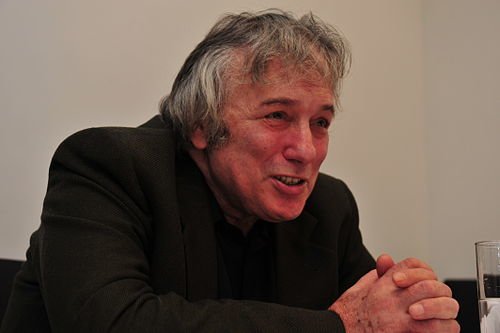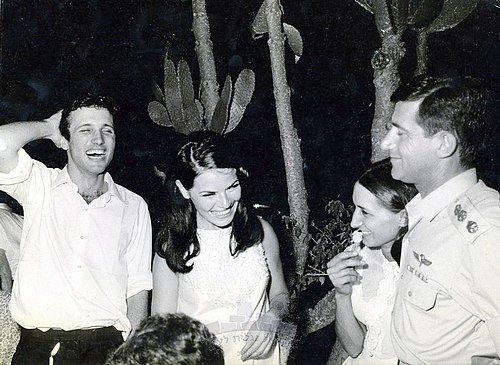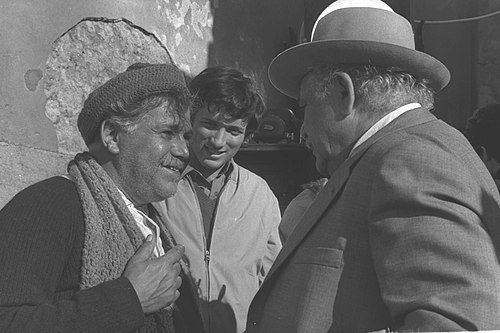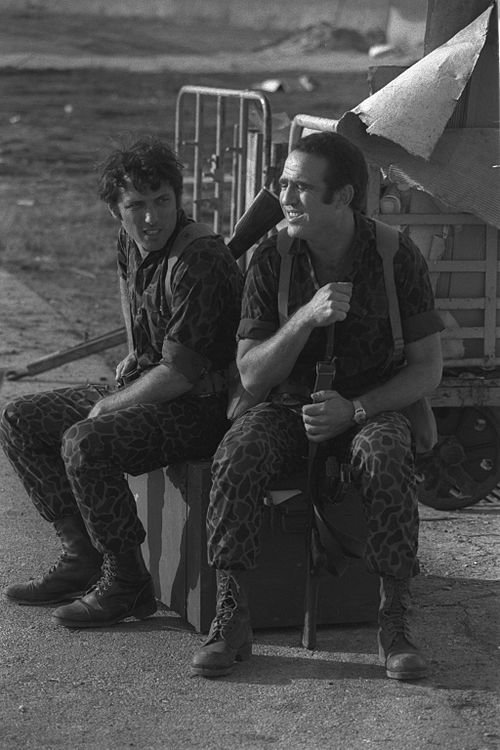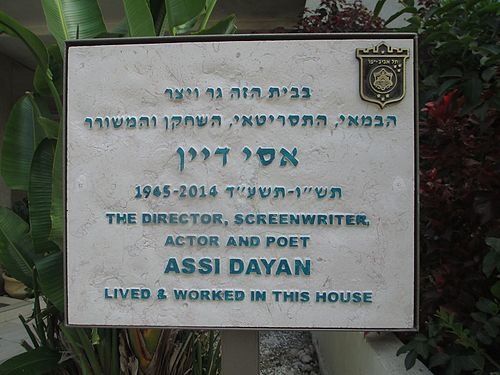Asaf (Asi) Dayan: A Multifaceted Israeli Talent
Asaf (Asi) Dayan, born on November 23, 1945, in Hulon, Israel, and passing away on May 1, 2014, was a prolific figure in the realm of Israeli cinema. His multifaceted career spanned directing, screenwriting, producing, acting, writing, poetry, songwriting, painting, journalism, and public relations.
Dayan was the son of the former Minister of Defense and Chief of Staff, Moshe Dayan, a highly celebrated and esteemed figure in Israeli national history. Since the late 1960s, Moshe Dayan earned widespread acclaim and became one of the most significant figures in Israeli cinema. Asi Dayan, however, made his own mark in the world of Israeli film and television, establishing himself as one of the prominent actors and directors in the industry.
Among Dayan's notable directorial works were comedies like "The Chosen Ones: What a Fine Mess!" (1976), "Giv'at Halfon Doesn't Answer" (1976), and "Shlager" (1979). In the 1990s, he directed a remarkable trilogy known as "The Agafá Trilogy," which delved into critical examinations of Israeli society and violence. This trilogy included "Life According to Agafá" (1992), "Electric Blanket and Her Name Passion" (1995), and "Mr. Baum" (1997).
Dayan received numerous awards throughout his career, most notably the Ophir Awards, where he holds the record with eight wins, including three for screenwriting, one for directing, two for lead actor, one for supporting actor, and one for lifetime achievement. He also received two Academy Awards for Best Actor in a Leading Role in TV dramas.
Early Life and Military Service
Asaf Dayan was born in 1945 to Ruth and Moshe Dayan in Hulon, Israel. At the age of 14, he began publishing his poetry in the "Keshet" quarterly magazine, edited by Aharon Amir. By age 15, he had released his first poetry book, "Temporary Autobiography," published by Aked.
In 1962, at the age of 17, Dayan was arrested in Cyprus and sentenced to one month in prison for carrying a firearm (taken from his father) and using his older brother's fake passport. He served his sentence alongside his friend Moshe Horowitz. Following their release after two weeks, he volunteered for the elite reconnaissance unit of the Israel Defense Forces (IDF) but was later reassigned to the Paratroopers Brigade. During his service in the Paratroopers, he underwent combat training, participated in military exercises, and took part in operational activities within the brigade. After leaving the IDF, Dayan studied philosophy and English literature for two years at the Hebrew University in Jerusalem.
Career Beginnings
Dayan's cinematic journey began in 1964 when his sister, Yael, invited him to witness the filming of the movie "Zorba the Greek," directed by her then-partner, Michael Cacoyannis, in Crete. During the shoot, Dayan was cast in a minor role in the film.
He was largely a self-taught filmmaker, yet he quickly rose to prominence in the Israeli film industry. Dayan initially started his cinematic career as an actor in nationalist visual films, portraying heroic figures with impressive titles and ranks. He played the role of Uri, a Palmach fighter, in the film "He Walked through the Fields" (1967), based on Moshe Shamir's book, which was considered a significant film in this genre. His charisma and recognition, coupled with the popularity of Israel after the Six-Day War, led to leading roles in foreign films like "Topaz" (1969) directed by John Huston.
Dayan starred alongside John Huston's daughter, Angelica, in "Topaz," marking her cinematic debut. In 1970, he appeared in "Promise at Dawn," directed by Jules Dassin.
On February 10, 1970, Dayan was present during the terrorist attack at the Munich airport. He was among the passengers on an El Al flight traveling from Lod to London, which was diverted to Munich. While on a bus transporting them from the terminal to the aircraft, three terrorists attacked the bus with automatic weapons and hand grenades. Uri Cohen, a fellow passenger and an Israeli security officer, confronted the terrorists, preventing a major catastrophe. One person was killed, and eleven were injured, including actress Hanna Maron.
Dayan also served as a reserve soldier in the IDF during the Yom Kippur War, fighting as a reservist in the 332nd Paratroopers Brigade, which was part of the regular Paratroopers Brigade. He participated in battles in the southern front, including Ras Sudar, against the Egyptian Third Army.
From Acting to Filmmaking
Dayan transitioned from acting to writing and filmmaking over time. His first film as a director, "Invitation to Murder" (1973), was a Tel Aviv police drama with surrealistic elements, marking a unique departure from the norm at the time. His subsequent film, "Celebration in the Eyes" (1975), was an existential narrative about a poet contemplating suicide. Following these, Dayan shifted to the popular genre of comedy with films like "The Chosen Ones: What a Fine Mess!" (1976), "Giv'at Halfon Doesn't Answer" (1976), "Shlager" (1979), and "King for a Day" (1980).
These films highlighted Dayan's distinctive writing style, characterized by a blend of high and low culture, using verbal absurdities to deconstruct societal norms (e.g., "No army in the world can stop me from making a pretzel out of the face of this accordionist" in "Giv'at Halfon Doesn't Answer"). These films also featured numerous cultural references, a hallmark of Dayan's work. For instance, in "Shlager," Menachem Zilberman humorously takes Ophra Haza to a film titled "The Embroiderer of the Gaza Strip," a parody of the high-quality film "The Embroiderer of the City" (1955).
The 1980s and 1990s
In the 1980s, Dayan continued with political comedies like "With Israel, Life Is Fun" (1981), youth dramas such as "Matriculation Blues" (1983), and crime comedies like "The Good, the Bad, and the Not So Ugly" (1986).
In 1992, Dayan directed what is considered his magnum opus, "Life According to Agafá." This film is often regarded as one of the most significant in Israeli cinema history. It portrays a night in a Tel Aviv pub, serving as a microcosm of Israeli society. The characters critiquing society in the pub, managed by a character played by Gila Almagor, represent not only Israeli society but also the repertoire of images and stereotypes in Israeli cinema.
The film challenges these conventions in a bold and artistic manner. In "Life According to Agafá," Dayan reconciles with his father's militant legacy and the characters he himself portrayed in films like "He Walked through the Fields" and "Promise at Dawn."
Following "Life According to Agafá," Dayan directed two other films in the trilogy, "Electric Blanket and Her Name Passion" (1995) and "Mr. Baum" (1997). These films also critically engage with Israeli society, focusing on marginalized and disenfranchised characters.
Notable Achievements
Asaf Dayan achieved numerous awards and accolades throughout his multifaceted career. Some of his notable achievements include:
1. Ophir Awards: Dayan won eight Ophir Awards (the Israeli equivalent of the Oscars) during his career. These included awards for screenwriting, directing, lead actor, supporting actor, and lifetime achievement.
2. Academy Awards: He received two Academy Awards for Best Actor in a Leading Role in Israeli TV dramas.
3. Legacy: Dayan's contributions to Israeli cinema and culture remain a significant part of the nation's artistic heritage. His films, especially those in the "Agafá Trilogy," continue to be studied and celebrated for their artistic and social significance.
Personal Life
Asaf Dayan's personal life was marked by ups and downs. He struggled with addiction and mental health issues, which he candidly discussed in his autobiography, "My Case" (1984). He was married three times, with his first marriage being to Dafna in 1967, followed by a marriage to Yael Annette Dayan in 1973.
He had a son named Zohar Dayan with his second wife, Yael. His third marriage was to Dalia Shimko in 1988. Dayan was also known for his relationships with prominent women, including actress Gila Almagor.
Dayan's battles with addiction and personal struggles were well-documented, and they significantly impacted his life and career. Despite these challenges, he continued to produce innovative and thought-provoking works of cinema.
Legacy
Asaf Dayan's legacy in Israeli cinema is marked by his unique artistic vision, bold storytelling, and willingness to confront societal issues and conventions. He was a multifaceted talent who excelled as an actor, director, screenwriter, and producer. His work continues to be studied and celebrated in Israel and beyond, and he remains a prominent figure in the history of Israeli cinema. Dayan's exploration of Israeli identity, society, and culture in his films has left a lasting impact on the nation's cinematic landscape.
Despite his struggles, Asaf Dayan's contributions to Israeli culture and his ability to provoke thought and reflection through his work ensure that his legacy endures. His films continue to be appreciated and analyzed for their relevance to contemporary Israeli society, making him a celebrated and influential figure in Israeli cinema history.
- אסי דייןhe.wikipedia.org
